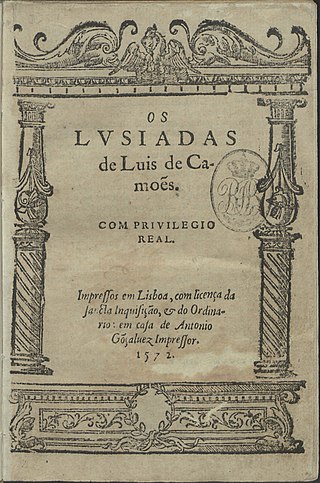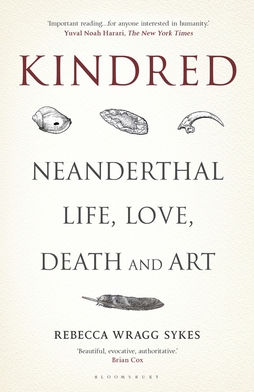Related Research Articles

D. Vasco da Gama, 1st Count of Vidigueira, was a Portuguese explorer and nobleman who was the first European to reach India by sea.
The PEN Hessell-Tiltman Prize is awarded to the best work of non-fiction of historical content covering a period up to and including World War II, and published in the year of the award. The books are to be of high literary merit, but not primarily academic. The prize is organized by the English PEN. Marjorie Hessell-Tiltman was a member of PEN during the 1960s and 1970s; on her death in 1999 she bequeathed £100,000 to the PEN Literary Foundation to found a prize in her name. Each year's winner receives £2,000.

Os Lusíadas, usually translated as The Lusiads, is a Portuguese epic poem written by Luís Vaz de Camões and first published in 1572. It is widely regarded as the most important work of Portuguese-language literature and is frequently compared to Virgil's Aeneid. The work celebrates the discovery of a sea route to India by the Portuguese explorer Vasco da Gama (1469–1524). The ten cantos of the poem are in ottava rima and total 1,102 stanzas.

The Vasco da Gama Bridge is a cable-stayed bridge flanked by viaducts that spans the Tagus River in Parque das Nações in Lisbon, the capital of Portugal.

Vasco da Gama is a cruise ship operated by German cruise line Nicko Cruises. Completed in 1993, she previously sailed for Holland America Line as MS Statendam, for P&O Cruises Australia as Pacific Eden and for Cruise & Maritime Voyages as Vasco da Gama. In 2020, following CMV's filing for administration, she was sold by CW Kellock & Co Ltd. at auction to Mystic Cruises' parent company, Mystic Invest for US$10,187,000.

Abraham Zacuto was a Castilian astronomer, astrologer, mathematician, rabbi and historian who served as Royal Astronomer to King John II of Portugal.

Amanda Lucy Foreman is a British-American biographer and historian. Her books include Georgiana, Duchess of Devonshire, A World on Fire, and The World Made by Women. She also wrote and starred in a four-part documentary regarding the role of women in society, entitled The Ascent of Woman. Currently, she is a columnist for The Wall Street Journal bi-weekly 'Historically Speaking' and an Honorary Research Senior Fellow in the History Department at the University of Liverpool.
Aḥmad ibn Mājid, also known as the "Arab Admiral" and the "Lion of the Sea", was an Arab navigator and cartographer born c. 1432 in Julfar, the present-day Ras Al Khaimah in the United Arab Emirates. He was raised in a family famous for seafaring; at the age of seventeen he was able to navigate ships. The exact date is not known, but Ibn Mājid probably died around 1500. Although long identified in the West as the navigator who helped Vasco da Gama find his way from Africa to India, contemporary research has shown Ibn Mājid is unlikely even to have met Da Gama. Ibn Mājid was the author of nearly forty works of poetry and prose.

The Astor Place Riot occurred on May 10, 1849, at the now-demolished Astor Opera House in Manhattan and left between 22 and 31 rioters dead, and more than 120 people injured. It was the deadliest to that date of a number of civic disturbances in Manhattan, which generally pitted immigrants and nativists against each other, or together against the wealthy who controlled the city's police and the state militia.

Vasco da Gama, often shortened to Vasco, is a city in the state of Goa on the west coast of India. It is named after the Portuguese explorer Vasco da Gama. It is the headquarters of the Mormugão taluka (subdistrict). The city lies on the western tip of the Mormugao peninsula, at the mouth of the Zuari River, about 30 kilometres (19 mi) from Panaji, Goa's capital, 28 kilometres (17 mi) from Margao, the district headquarters and about 5 kilometres (3.1 mi) from Dabolim Airport.

L'Africaine is an 1865 French grand opéra in five acts with music by Giacomo Meyerbeer and a libretto by Eugène Scribe. Meyerbeer and Scribe began working on the opera in 1837, using the title L'Africaine, but around 1852 changed the plot to portray fictitious events in the life of the Portuguese explorer Vasco da Gama and introduced the working title Vasco de Gama, the French version of his name. The copying of the full score was completed the day before Meyerbeer died in 1864.
Mark Mazower is a British historian. His areas of expertise are Greece, the Balkans, and more generally, 20th-century Europe. He is Ira D. Wallach Professor of History at Columbia University in New York City.
David Louis Mearns, OAM, is an American-born United Kingdom based marine scientist and oceanographer, who specializes in deep water search and recovery operations, and the discovery of the location of historic shipwrecks.

David Reynolds, is a British historian. He is Emeritus Professor of International History at Cambridge University and a Fellow of Christ's College, Cambridge.

Viviana Durante is an Italian ballet dancer, considered one of the great dramatic ballerinas of recent times. She was a principal dancer of The Royal Ballet, American Ballet Theatre, Teatro alla Scala and K-Ballet. She is the artistic director of English National Ballet School and of the Viviana Durante Company.
Gaspar da Gama also known as Gaspar da India and Gaspar de Almeida was an interpreter and guide to several fleets of the Portuguese maritime explorations. He was of Jewish origin and was probably born in Poznań in the Kingdom of Poland. In 1498 he was taken captive aboard Vasco da Gama's fleet on its return voyage to Portugal from India. He was known to speak multiple languages including Hebrew and Chaldean, as well as a mixture of Italian and Spanish.

Daniel Gwynne Jones is a British popular historian, TV presenter, and journalist. He was educated at The Royal Latin School, a state grammar school in Buckingham, before attending Pembroke College, Cambridge.
Edward Wilson-Lee is an English literature academic at Sidney Sussex College, Cambridge, and a specialist in the literature and the history of the book in the early modern period.

Kindred: Neanderthal Life, Love, Death and Art is a 2020 book by Rebecca Wragg Sykes that examines Neanderthals. The book has three "positive" reviews and eight "rave" reviews according to review aggregator Book Marks.
References
- ↑ Cliff, Nigel. "About Nigel". Nigel Cliff. Retrieved 17 June 2022.
- ↑ "Oxford University Gazette" (4372). 27 July 1995. Retrieved 13 June 2016.
{{cite journal}}: Cite journal requires|journal=(help) - ↑ "Holy War". Harpercollins publishers llc.
- ↑ "Nigel Cliff" . Retrieved 28 March 2018.
- ↑ "The New York Times - Search". New York Times. Retrieved 8 November 2021.
- ↑ "Kellogg College Creative Writing Seminar Series". 19 September 2015. Retrieved 13 June 2016.
- ↑ Telling, Kathleen. "Bardolatry reaches fever pitch in Nigel Cliff's The Shakespeare Riots". Cultural Compass. Retrieved 13 June 2016.
- ↑ "Dying for Shakespeare". The British Library. Retrieved 13 June 2016.
- ↑ "BBC Radio 4 - Start the Week, the Bolshoi and Culture Wars". bbc.co.uk. Retrieved 8 November 2021.
- ↑ "The history of pianist van Cliburn and his impact on U.S.-Russia relations". MSNBC. Retrieved 8 November 2021.
- ↑ "Nigel Cliff". Royal Literary Fund. Retrieved 28 March 2018.
- ↑ "Trustees | Viviana Durante Official Website". Viviana Durante. Retrieved 8 November 2021.
- ↑ "DANCE INVERSION. International Contemporary Dance Festival". DanceInversion. Retrieved 8 November 2021.
- ↑ Dobson, Michael (2 August 2007). "Let him be Caesar!". London Review of Books. 29 (15).
- ↑ Lopate, Phillip (15 April 2007). "What fools these mortals be". Los Angeles Times.
- ↑ "Book World's Holiday Issue". The Washington Post. 2 December 2007.
- ↑ "2007 Marfield Prize". Arts Club of Washington. Retrieved 13 June 2016.
- ↑ Goodridge, Mike (15 May 2011). "Muse lines up slate of hot literary adaptations". Screen International. Retrieved 14 June 2016.
- ↑ "Holy War". Harpercollins publishers llc. Retrieved 13 June 2016.
- ↑ "The Last Crusade". Harpercollins publishers llc. Retrieved 13 June 2016.
- ↑ "Book of the Week". Atlantic books. Archived from the original on 13 July 2016. Retrieved 13 June 2016.
- ↑ "Nigel Cliff official website" . Retrieved 13 June 2016.
- ↑ "100 Notable Books of 2011". The New York Times. 21 November 2011. Retrieved 13 June 2016.
- ↑ "English PEN Hessell-Tiltman Prize for History 2013 shortlist announced". English PEN. Retrieved 13 June 2016.
- ↑ "Maritime Media Awards 2012 - Maritime Foundation". Maritime Foundation. Retrieved 8 November 2021.
- ↑ Ormsby, Eric (9 September 2011). "Why Vasco da Gama Went to India". The New York Times. Retrieved 13 June 2016.
- ↑ McConnachie, James (1 April 2012). "The Last Crusade". Sunday Times. Archived from the original on 19 April 2013. Retrieved 13 June 2016.
- ↑ The Travels . Retrieved 15 November 2016.
{{cite book}}:|website=ignored (help) - ↑ "Moscow Nights". Harpercollins publishers llc. Retrieved 13 June 2016.
- ↑ Alter, Alexandra (17 January 2017). "Zadie Smith and Michael Chabon Among National Book Critics Circle Finalists". New York Times. Retrieved 27 January 2017.
- ↑ "Nautilus Awards" (PDF). Nautilus Award Winners. Archived from the original (PDF) on 30 October 2017. Retrieved 4 May 2017.
- ↑ "Birthdays: Viviana Durante". The Times. 8 May 2010. Retrieved 22 December 2019.
- ↑ Parry, Jann (8 November 2016). "Interview – Viviana Durante: Ballerina, mother, teacher and coach of MacMillan's Anastasia". DanceTabs. Retrieved 22 December 2019.